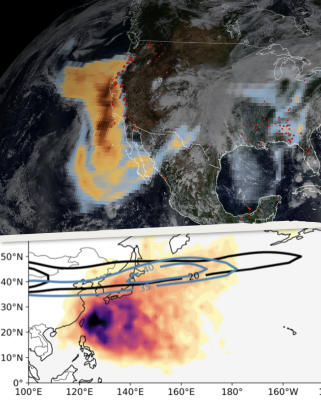New Study Shows How Extratropical Transitioning Cyclones Affect North American Fire Weather
A new study has uncovered the relationship between extratropical transitioning cyclones (ETCs) and North American fire weather. When tropical cyclones in the western North Pacific transition into midlatitude cyclones, it often perturbs the jet stream, resulting in amplified flow conditions in the North Pacific and various weather extremes in North America. However, the climatological impacts of ETCs on North American fire weather have been mostly undocumented until now. In this study, ETCs are grouped by the characteristics that are important for their interaction with the jet stream, and the response in North American fire weather is documented.
The researchers found that ETCs are consistently associated with broad swaths of suppressed fire weather along with smaller areas of enhanced fire weather in North America, mostly through anomalous upper-level circulation and near-surface temperatures. While the chaotic nature of the ETC and jet stream interaction means that ETCs grouped by similar characteristics and locations can result in varying downstream responses, the composite analysis reveals some areas of consistently altered fire weather for ETCs which recurve at certain longitudinal ranges, including the Pacific Northwest and northern Intermountain West.
With the well-documented increase in wildfire severity and intensity, largely a result of climate change, forest management practices, and shifts in ignition to more anthropogenic causes, the relationship between ETCs and actual fire events could be changing too. The study highlights the importance of understanding the impact of tropical cyclones on Western North America and the need for continued research into how extratropical transitioning cyclones affect North American fire weather. By better understanding the relationship between ETCs and fire weather, we can improve our ability to forecast and mitigate the impact of wildfires, which is especially critical in the face of climate change.
This study found that extratropical transitioning cyclones (ETCs) impact North American fire weather by altering upper-level circulation and near-surface temperatures related to heat. ETCs are associated with both suppressed and enhanced fire weather in North America, with consistent impacts observed in the Pacific Northwest and northern Intermountain West. As wildfires become more severe and frequent due to climate change, it is critical to understand the relationship between ETCs and fire weather to improve our ability to forecast and mitigate their impact.

